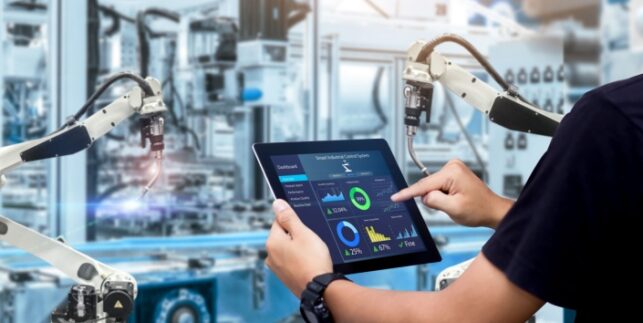The Importance of Work Management Tools on Your Shop Floor

The rise of new Industry 4.0 solutions has led to many manufacturers implementing new methods for monitoring, control, and optimizing the shop floor. However, new technology has also brought about an entirely new class of resources – work management tools. With the right solution, manufacturers can use these tools to increase productivity and efficiency in ways they could never have imagined.
What Are Work Management Tools?
The world of modern manufacturing is becoming more and more focused on production data. Aggregating and analyzing this data are essential, but today manufacturers can go a step further with tools that let operations collaborate and put data and insights to the best possible use.
Work management tools take this information and use it to accomplish specific tasks on the shop floor and throughout the organization. They go beyond simply making information available and let managers create, define, and implement improved workflows that take full advantage of many Industry 4.0 capabilities.
With the right solution, manufacturers can access a wide range of work management tools to improve operations on the shop floor. Matics Real-time Operational Intelligence (RtOI) provides a comprehensive collection of work management tools that give manufacturers everything they need to realize the potential of their shop floor.https://matics.live/use-cases/real-time-operational-intelligence-rtoi/
Real-time Alerts
The simplest implementation of work management tools is the use of real-time alerts. As RtOI aggregates production data and carries out analyses in real-time, specific insights into production parameters and KPIs can automatically trigger alerts.
With RtOI, manufacturers have significant control over the nature of the real-time alerts they receive. Thresholds can be defined and optimized over time, and custom KPI creation allows manufacturers to focus on the factors that are most important to their unique operations.
These real-time alerts differ from the simple alarms that have been commonplace in MES and control systems for decades. They rely on the sophisticated analysis of production data in real-time to greatly expand the types of events that can serve as triggers, along with the speed and accuracy of alerts.
Rule Allocation
Real-time alerts make effective use of event triggers, but RtOI allows manufacturers to define and implement more complex workflows around those triggers. When an event happens, rule allocations provide a more complex response that can involve multiple steps affecting different elements on the shop floor.
Through rule allocation, manufacturers can ensure that the appropriate information and context are distributed to the right stakeholders, including separate calls to action for stakeholders in different roles. Service calls can be automatically generated within the system, eliminating another step between an event trigger and action being taken.
These rule allocations are entirely within the control of manufacturers, allowing them to define the workflows as they see fit for their shop floor. With time, the analytics and insights provided by RtOI allow for continuous improvement in rule allocations to develop even more effective automated workflows.
Integrated Communications
Work management tools also have a considerable focus on communications. Matics RtOI enables communications between managers, operators, technicians, and other stakeholders with integrated in-app communications.
One of the core features of these integrated communications is machine-based communication. Messages are no longer sent through other systems or even accessed through independent threads within the system. Instead, all communications regarding specific machines are linked to those machines, including maintenance, productivity, quality, and other factors.
This ensures that all knowledge and shop floor communications are captured and consolidated so that no information of value is lost. No matter who is currently operating a machine, they have constant access to all production contexts.
Task Management
Work management tools give managers more control over what’s happening on the shop floor. With production data and analytics available in real-time, managers can know exactly what’s happening at any given moment. Task management tools then allow managers to take decisive action based on that insight.
Through task management, managers can assign and manage tasks remotely. They can do this for the many stakeholders and machines on the shop floor, providing a granular level of management that benefits from the overall production context provided by RtOI.
Task management can be heavily optimized based on current and historical parameters and KPIs. With these tools, managers can ensure that all resources are being used as efficiently as possible in terms of stakeholder and machine allocations.
Process Automation
At the cutting edge of work management tools is the implementation of process automation within real-time systems. Now, complex sequences of events can be tied to triggers and analytics in real-time, putting sophisticated workflows into action as quickly as possible in reaction to changes and events.
RtOI incorporates process automation based on complex analytics that takes historical production data and maps the trends that lead to machine unavailability, failed quality thresholds, and other out-of-control process scenarios. Now, some workflows can be put into action before trigger events occur, shifting the shop floor from a reactive to a proactive approach.
How Do These Tools Improve Manufacturing Operations?
Together, these work management tools come together to provide manufacturers with a wide range of actions for improving operations on the shop floor. They put managers in real control over what’s happening in real-time.
Work management tools are important capabilities that bridgethe gap between production data and practical action. By taking advantage of the many work management tools implemented through RtOI, manufacturers can unlock these benefits for their operations.
Reduced Latency
One of the most direct impacts that work management tools can have on the shop floor is the reduction of latency between events happening and the response to resolve them. Without these tools, considerable time is lost identifying and analyzing the issue and then deciding what needs to be done.
With work management tools, these steps are mostly or entirely automated. RtOI detects events such as machine shutdowns or KPIs drifting outside of thresholds immediately. From there, the custom workflows and responses that managers have developed with work management tools spring into action automatically and reduce the time and resources lost by any critical event.
Improved Collaboration
Work management tools make it easier for stakeholders at every level and in every role to collaborate more effectively. Managers use these tools to coordinate and communicate with operators and technicians on the shop floor more quickly and with the necessary production context to let them do their jobs more effectively.
Every role has access to the essential context and production data they need to take decisive action. Instead of wasting time determining who needs to carry out which tasks and where, the automation provided by workflow management tools sets a planned response into action right away.
Maximizing Data Leverage
Production data and analytics are valuable resources that managers can leverage to improve operations. These insights alone can’t make real change happen on the shop floor, so work management tools provide practical methods for managers to manage and optimize operations in real-time.
With work management tools, managers can be constantly aware of what’s happening on the shop floor with incredible accuracy. Together with real-time alerts and insights, this access allows managers to take decisive action and extract the full value of the data aggregation and analytics provided by RtOI.

Changing the way people work in factories
Request a DemoPutting Work Management Tools to Work for Your Shop Floor
RtOI is a comprehensive solution that provides data aggregation and analytics, along with the work management tools required to make the best possible use of that data. With Matics, manufacturers have a solution that works at every level, with the required dedicated apps and customization to let every stakeholder do their job as effectively as possible.
The work management tools of RtOI put managers in control of the shop floor in ways that simply weren’t possible before. You can reach out to our team today to find out how our work management tools can transform the way you manage your shop floor.




